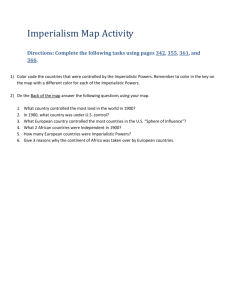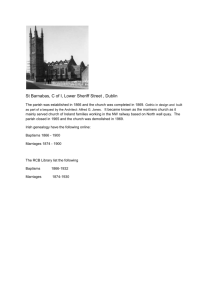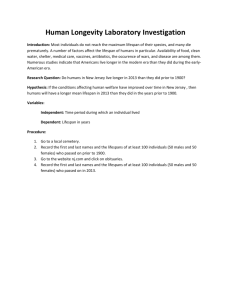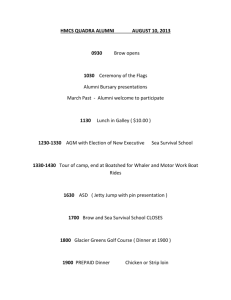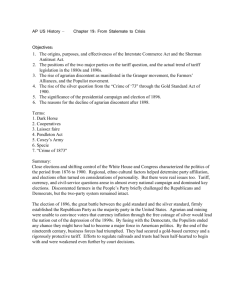1 January 1900 The British government revokes
advertisement
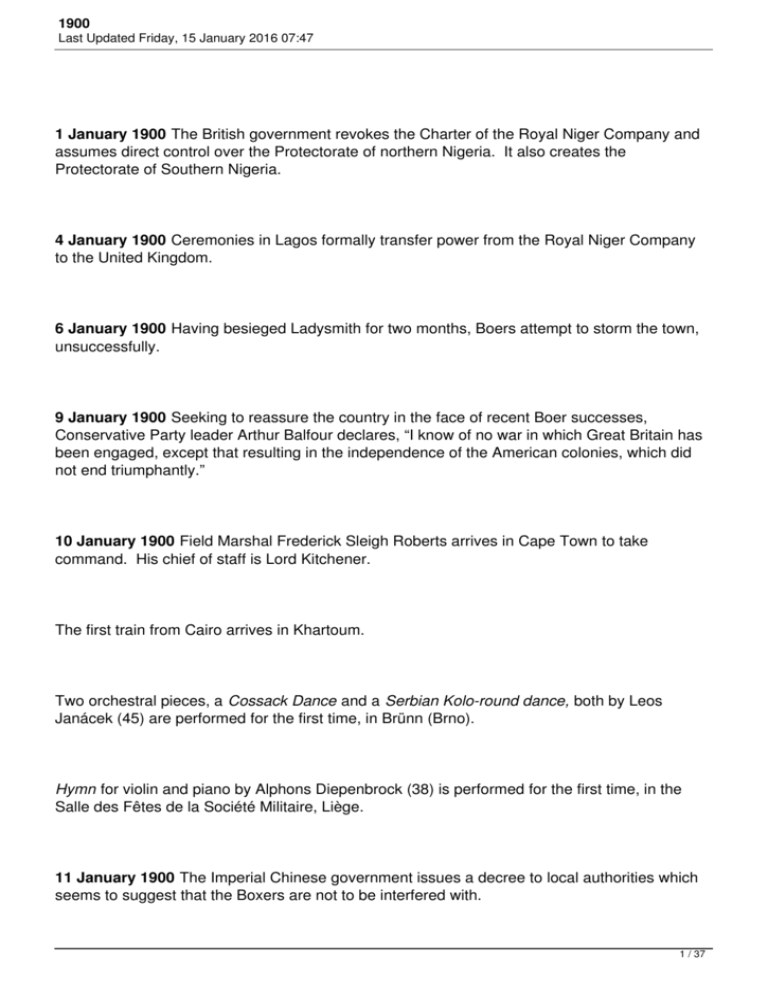
1900 Last Updated Friday, 15 January 2016 07:47 1 January 1900 The British government revokes the Charter of the Royal Niger Company and assumes direct control over the Protectorate of northern Nigeria. It also creates the Protectorate of Southern Nigeria. 4 January 1900 Ceremonies in Lagos formally transfer power from the Royal Niger Company to the United Kingdom. 6 January 1900 Having besieged Ladysmith for two months, Boers attempt to storm the town, unsuccessfully. 9 January 1900 Seeking to reassure the country in the face of recent Boer successes, Conservative Party leader Arthur Balfour declares, “I know of no war in which Great Britain has been engaged, except that resulting in the independence of the American colonies, which did not end triumphantly.” 10 January 1900 Field Marshal Frederick Sleigh Roberts arrives in Cape Town to take command. His chief of staff is Lord Kitchener. The first train from Cairo arrives in Khartoum. Two orchestral pieces, a Cossack Dance and a Serbian Kolo-round dance, both by Leos Janácek (45) are performed for the first time, in Brünn (Brno). Hymn for violin and piano by Alphons Diepenbrock (38) is performed for the first time, in the Salle des Fêtes de la Société Militaire, Liège. 11 January 1900 The Imperial Chinese government issues a decree to local authorities which seems to suggest that the Boxers are not to be interfered with. 1 / 37 1900 Last Updated Friday, 15 January 2016 07:47 13 January 1900 Emperor Franz Joseph II rules that German will be the language of the Imperial Army of Austria-Hungary. It is a move against Czech nationalism. 14 January 1900 Das irdische Leben and Wo die schönen Trompeten blasen, from the song cycle Des Knaben Wunderhorn , words by Brentano and von Arnim, music by Gustav Mahler (39), are performed for the first time, in Vienna at a concert of Mahler lieder conducted by the composer. Tosca, a melodramma with words by Illica and Giacosa after Sardou and music by Giacomo Puccini (41) is performed for the first time, before a glittering audience in Teatro Costanzi, Rome. The composer is called eight times. But the critics are mixed and generally negative. Mexican forces defeat Yaqui Indians at Mazocoba. Over 400 Yaquis are killed and 1,800 captured, mostly noncombatants. They will be forced to march to captivity where over half will die. 19 January 1900 Ernst von Koerber replaces Heinrich von Wittek as Chancellor of Austria. 20 January 1900 As part of a plan to control bubonic plague in Honolulu, firefighters set fire to a building to control rats. The fire gets out of control and burns most of the Chinese section of the city. 4,000 people are left homeless. 21 January 1900 The prelude to the third act of Johann Strauss’ (†0) unperformed ballet Asche nbrödel is heard for the first time, in the Musikverein, Vienna. 22 January 1900 Sergey Rakhmaninov (26) and Fyodor Ivanovich Chaliapin visit the home of Tolstoy. They perform some songs including Fate. The writer responds by asking the point of the music. “Beethoven is nonsense. So too is Pushkin and Lermontov.” He 2 / 37 1900 Last Updated Friday, 15 January 2016 07:47 calls Apukhtin’s poem “abominable.” Fate 24 January 1900 British forces attack Boers at Spion Kop, just east of Basutoland (Lesotho). They are beaten back. Wounded are carried from the field by the Natal Indian Ambulance Corps, including its founder, Mohandas K. Gandhi. 27 January 1900 The ministers to China of the UK, US, France, Germany, and Italy send a protest to the Imperial Court demanding the suppression of the Boxers. The Neue Bach Gesellschaft if formed to promote the music of JS Bach (†149) and produce performing editions. Deux épigrammes de Clément Marot by Maurice Ravel (24) for solo voice and piano is performed for the first time, at the Salle Erard, Paris. The composer performs the piano part. A string quartet by Ernest Chausson (†0), finished by Vincent d’Indy (48), is performed for the first time, by the Société National de Musique, Paris. Also premiered is Chausson’s song La Chanson bien douce from Deux poèmes de Verlaine op.34 and Dans la forêt du charme et de l’enchantement for voice and piano to words of Moréas from op.36. 2 February 1900 Louise, a roman musical by Gustave Charpentier (39) to words of Saint-Pol-Roux and the composer, is performed for the first time, at the Théâtre Favart in Paris. It will be staged 50 times in the next six months. Claude Debussy (37) will write, “It was a necessity, I think, for this work to be written, performed, and applauded. It fills to perfection the need for vulgar beauty and imbecile art proclaimed by the many…” The Adonais Overture of George Whitefield Chadwick (45) is performed for the first time, in the 3 / 37 1900 Last Updated Friday, 15 January 2016 07:47 Music Hall, Boston. 6 February 1900 Representatives of Great Britain and the US sign an agreement in Washington. It allows the US to build a canal in Central America but it must be unfortified and neutral. 7 February 1900 After three days of fighting, the British attack on Boers at Vaal Krantz is abandoned. 8 February 1900 Boers force British troops to withdraw from Vaal Krantz, their last major victory. 9 February 1900 String Quartet no.5 by George Whitefield Chadwick (45) is performed for the first time, in Boston. 12 February 1900 Abomey in west Africa is annexed by France. The Viceroy, an operetta by Victor Herbert (41) to words of Smith, is performed for the first time, at the Columbia Theatre, San Francisco. See 9 April 1900. 14 February 1900 An editorial in the North China Herald predicts a massive insurrection throughout China this summer to expel all foreigners. 20,000 British troops invade the Orange Free State. 15 February 1900 British forces relieve Kimberley, 100 km west of Bloemfontein. 4 / 37 1900 Last Updated Friday, 15 January 2016 07:47 Selbstgefühl for solo voice and piano, words by Brentano and von Arnim, music by Gustav Mahler (39), is performed for the first time, in Vienna. 16 February 1900 Carsten Borchgrevink and two others reach a furthest south at 78°50’S on the Ross Ice Shelf. 17 February 1900 British artillery opens fire on a Boer force on the Modder River near Paardeberg. 18 February 1900 British forces capture the top of Monte Cristo (300m), near Colenso, Natal. 19 February 1900 Hard pressed by the British, the Boers abandon Hlangwane hill and the south bank of the Tugela River near Colenso. 21 February 1900 The Seasons, a ballet by Alyeksandr Glazunov (34), is performed for the first time, at the Hermitage Theatre, St. Petersburg. 22 February 1900 British forces capture Wynne’s Hill near Colenso, Natal. Given the condemnation of some of the orchestra and all of the critics to Gustav Mahler’s (39) “modification” of Beethoven’s (†72) Symphony no.9, the audience at the second performance receive a lengthy written explanation of his actions by the conductor. It only serves to fuel the controversy. 27 February 1900 After a ten-day battle, Boer defenders at Paardeberg surrender to the besieging British. British break through Boers at Pietershoogte allowing for the relief of Ladysmith. 5 / 37 1900 Last Updated Friday, 15 January 2016 07:47 The Trades Union Congress and the Independent Labour Party of Britain join to form the Labour Representation Committee, later to become the Labour Party. 28 February 1900 British forces relieve Ladysmith, Natal. The defenders have been cut off by Boers for 119 days. 1 March 1900 Mass celebrations erupt in Britain with the news of the relief of Ladysmith. Germany formally annexes the Samoan Islands except for those promised to the United States. 2 March 1900 Curt Julian Weill is born in Dessau, the third of four children born to Albert Weill, chief cantor at the Dessau synagogue and composer of sacred music, and Emma Ackerman, daughter of a rabbi. Two songs for voice and piano by Edward Elgar (42), After (words by Marston) and A Song of Flight (words by Rossetti) op.31, are performed for the first time, in St. James’ Hall, London. 4 March 1900 The first railroad in Nigeria opens between Lagos and Ibadan. 6 March 1900 Carl Bechstein dies in Berlin at the age of 73. The Piano Sonata no.3 op.23 by Alyeksandr Skryabin (28) is performed for the first time, in Moscow. A Chinese resident of San Francisco dies of bubonic plague. Police institute a ghetto by roping 6 / 37 1900 Last Updated Friday, 15 January 2016 07:47 off 15 square blocks of Chinatown. They raid and fumigate Chinese dwellings. 200 people will die of the plague. 7 March 1900 SS Kaiser Wilhelm der Grosse contacts Borkum by means of wireless signals, at a distance of some 80 km. It is the first recorded long distance transmission from a passenger ship. 8 March 1900 Sea Idyll for piano by John Ireland (20) is performed for the first time, in Alexandra House, London, by the composer. 9 March 1900 Ballet music to the unperformed opera Azara by John Knowles Paine (61) is performed for the first time, in Boston. See 7 May 1903. 10 March 1900 British troops force the Boers back at Driefontein. The piano piece Tarantelle styrienne by Claude Debussy (37) is performed for the first time, at the Société National de Musique, Paris. 12 March 1900 President Marthinus Steyn and the government of the Orange Free State abandon the capital Bloemfontein before the approaching British. Malinconia op.20 for cello and piano by Jean Sibelius (34) is performed for the first time, in Helsinki. 13 March 1900 British forces capture Bloemfontein, capital of the Orange Free State. 14 March 1900 US President McKinley signs a law putting the United States on the gold standard. 7 / 37 1900 Last Updated Friday, 15 January 2016 07:47 15 March 1900 Colin Carhart McPhee is born in Montreal, first child of Alexander McPhee, who worked in sales for the Bell Telephone Company, and Lavinia Carhart. The oratorio La terre promise, words from the Bible, music by Jules Massenet (57) is performed for the first time, at the church of St. Eustache, Paris. Fragments of the incomplete romantic opera Viola by Bedrich Smetana (†15) to words of Krásnohorská after Shakespeare, are performed for the first time, in a concert setting in Prague. See 11 May 1924. 16 March 1900 Sandels for male chorus and orchestra by Jean Sibelius (34) to words of Runeberg, is performed for the first time, in Helsinki. The work celebrates Swedish General Johan Sandels and his defeat of the Russians north of Iisalmi, Finland in 1808. 17 March 1900 Chansons de Bilitis for solo voice and piano, words by Louÿs and music by Claude Debussy (37) is performed for the first time, at the Salle Pleyel, Paris, the composer at the keyboard. 18 March 1900 The openly anti-Semitic Deutsche Zeitung of Vienna publishes a lengthy and blistering attack on the conductorship of Gustav Mahler (39). Nikolay Rimsky-Korsakov conducts at the Théâtre de la Monnaie, Brussels on his 56th birthday. 19 March 1900 Richard Strauss (35) and Hans Pfitzner (30) begin their rivalry at a joint concert in Berlin. 22 March 1900 Sergey Rakhmaninov’s (26) song Fate, for voice and piano to words of Apukhtin, is performed publicly for the first time, in the Hall of the Nobility, Moscow, the 8 / 37 1900 Last Updated Friday, 15 January 2016 07:47 composer at the keyboard. The audience calls for it to be encored. 23 March 1900 British archaeologist Arthur Evans begins to excavate Knossos in northern Crete. He will discover the Minoan Civilization dating from as early as 3000 BC. 24 March 1900 The Carnegie Steel Corporation is incorporated. With assets of $160,000,000 it is the largest corporation yet seen. 28 March 1900 The British governor of the Gold Coast, Frederick Hodgson, arrives in the Ashanti center of Kumasi and demands to sit on the Golden Stool, the symbol of the Ashanti kingdom. The assembled Ashanti are aghast and outraged. The Ashanti under Yaa Asantewaa begin an uprising against British rule. 29 March 1900 An Andante for orchestra (from the Symphony in a minor op.1) by Franz Schreker (22) is performed for the first time, in Vienna, directed by the composer. 31 March 1900 Boers surprise the British at Sanna’s Post near Bloemfontein, forcing them back and capturing the water works for the city. The French National Assembly passes a law to reduce work days for all workers, including women and children, to eleven hours. Bubonic Plague is declared contained in Honolulu. Since December, 61 people have died of the disease. 4 April 1900 As a train carrying Edward, Prince of Wales begins to depart the Nord station in Brussels, Jean-Baptiste Sipido fires two shots into the Prince’s compartment. No one is injured and Sipido is apprehended by the crowds. Sipido blames the Prince “in promoting the slaughter of the South African Boers.” 9 / 37 1900 Last Updated Friday, 15 January 2016 07:47 Boers attack and defeat a British convoy at Reddersburg. Antonín Dvorák (58) makes his last appearance as conductor, directing the Czech Philharmonic in Prague. The Woodman’s Song op.18/5 for male chorus by Jean Sibelius (34) is performed for the first time, in Helsinki. 7 April 1900 Piano Concerto in c# minor op.45 by Amy Cheney Beach (32) is performed for the first time, in the Music Hall, Boston, the composer at the keyboard. Critics are disappointed. There was an open rehearsal yesterday. 9 April 1900 French physicist Paul Ulrich-Villard presents a paper on his recent work to the Académie des Sciences in Paris. He describes radium rays that are shorter and more penetrating than X-rays. They are of little interest to his colleagues, but in 1914 they will come to be known as gamma rays. The Viceroy, an operetta by Victor Herbert (41) to words of Smith, is performed for the first time in New York, at the Knickerbocker Theatre, directed by the composer. 11 April 1900 The United States Navy receives the 16 meter Holland, the first submarine to be accepted by any navy. It’s inventor is John P. Holland. 12 April 1900 The Foraker Act creates a civilian government in Puerto Rico with a governor appointed by the US President. 14 April 1900 Ernest Boulanger dies in Paris while speaking with his daughter Nadia (12). 10 / 37 1900 Last Updated Friday, 15 January 2016 07:47 The Exposition Universelle is opened on a 220 hectare site in Paris by President Loubet. 15 April 1900 Filipinos attack and surround American troops at Catubig on Samar Island. 17 April 1900 The United States takes formal possession of the eastern Samoa Islands of Tutuila and Aunu'u. Americans withdraw from Catubig but the action turns into a rout under Filipino attacks. Some are able to escape by boat. 20 April 1900 Great Britain extends a protectorate over the island of Niue. 22 April 1900 French troops and their Baguirmi allies soundly defeat the forces of the warlord Rabih az-Zubayr at Kousséri (now on the Chad-Cameroon border). 24 April 1900 Hannibal Sehested replaces Hugo Egmont Hørring as Prime Minister of Denmark. The Italian/Norwegian expedition of Umberto Cagni reaches a farthest north of 86° 34’. 26 April 1900 A fire in Hull, Quebec leaves seven people dead and 12,000 people homeless. 30 April 1900 The director of the Opéra-Comique, Albert Carré, gives away 400 tickets to Gustave Charpentier’s (39) Louise to the dressmakers of Paris. 11 / 37 1900 Last Updated Friday, 15 January 2016 07:47 Hawaii is organized as a territory of the United States. Pipes of Pan, a song for voice and piano with words by Ross and music by Edward Elgar (42) is performed for the first time, at Crystal Palace, London. See 10 October 1902. 1 May 1900 Ottoman Sultan Abdülhamid II announces that the Hejaz Railroad will be extended from Damascus to Medina. A coal mine at Scofield, Utah explodes sending carbon monoxide through the mine, and killing around 200 men and boys. 5 May 1900 Demands by the I-ho ch’üan (Righteous and Harmonious Fists), known to the west as the “Boxers”, that foreign devils be killed appear in Peking and Tientsin newspapers. The Boxers are anti-foreign, especially anti-Christian. 6 May 1900 Vals-capricho for piano by Manuel de Falla (23) is performed for the first time, by the composer to an invited audience in the Madrid Ateneo. 7 May 1900 Mayor James D. Phelan of San Francisco tells a crowd that “The Chinese and Japanese are not bonafide citizens. They are not the stuff of which American citizens can be made.” 10 May 1900 Four songs for voice and piano by Charles Martin Loeffler (39) to words of Kahn are performed for the first time, at Green Hill, the summer home of Isabella Stewart Gardner, in Brookline, Massachusetts: Adieu pour jamais, Les soirs d’automne, Timbres oubliés and L es Paons . 11 May 1900 Liberal insurgents engage conservative government troops near Palonegro, 12 / 37 1900 Last Updated Friday, 15 January 2016 07:47 Colombia. The battle will go on for several days, with neither side gaining an advantage. 14 May 1900 Giuseppe Verdi (86) signs his will in Milan. The Games of the Second Olympiad of the Modern Era open in Paris. 15 May 1900 Today marks the first concert of the Society of Classical Concerts at the Teatre Liric in Barcelona. This is a subscription series founded by Enrique Granados (32) to promote symphonic and chamber music in the city. Granados conducts the inaugural performance. Both the concert and the project are warmly received by the press and public. Nicola Tesla receives a US patent for an “apparatus for transmission of electrical energy,” still the basic idea behind radio. 17 May 1900 British forces at Mafeking, South Africa, are relieved after a Boer siege of 217 days. Boxers destroy three villages near Peking and kill 60 Chinese Christians. The Wonderful Wizard of Oz by L. Frank Baum is published in Chicago. 18 May 1900 A treaty is concluded between Great Britain and Tonga. A British protectorate is declared over the islands. 24 May 1900 The United Kingdom annexes the Orange Free State. 13 / 37 1900 Last Updated Friday, 15 January 2016 07:47 Fantasy on Straf’ mich nicht in deinem Zorn op.40/2 for organ by Max Reger (27) is performed for the first time, in Brünn (Brno). 25 May 1900 Government troops having been reinforced, Liberal insurgents retreat from Palonegro, Colombia. 28 May 1900 Boxers destroy Feng-tai (Fengtai) railroad station and destroy part of the tracks. Foreign ministers in Peking decide that they must ask their fleets to send troops to protect the legations. 29 May 1900 French commander Émile Gentil founds Fort Lamy (N’Djamena), naming it after the French commander killed at the Battle of Kousséri. The Festival Song op.113 for chorus and orchestra, with words by Vrchlicky and music by Antonín Dvorák (58), is performed for the first time, privately in Prague. See 15 December 1905. 30 May 1900 Boxers take control of Tientsin, marching through the streets with the heads of Christian missionaries on their spears. Von edler Art, a song for voice and piano by Hubert Parry (52), is performed for the first time, in London. 31 May 1900 337 foreign troops arrive in Peking from Tientsin to protect the legations. British troops occupy Johannesburg. In the first official concert of the Paris Exhibition, Le feu céleste op.115 for narrator, soprano, 14 / 37 1900 Last Updated Friday, 15 January 2016 07:47 orchestra, and organ by Camille Saint-Saëns (64) to words of Sylvestre, is performed for the first time. 1 June 1900 Two English missionaries are tortured and killed by Boxers at Yung-ch'ing-hsien (Yongjing Xian) 65 km south of Peking. In this month’s issue of Century magazine, Nicola Tesla writes that with radio waves, “we may determine the relative position or course of a moving object, such as a vessel at sea, the distance traversed by the same, or its speed.” 3 June 1900 The newly appointed US Governor William H. Taft arrives in Manila. 4 June 1900 A group of missionaries become the last foreigners to escape Peking. Filipinos ambush a US force near the fort at Makahambus on Mindanao. After inflicting damage, the Filipinos retreat. 5 June 1900 British troops occupy Pretoria, capital of the Transvaal. 7 June 1900 Boxer rebels cut the railroad between Peking and Tientsin. 9 June 1900 Moslem troops of General Tung Fu-hsiang (Dong Fuxiang) enter Peking and with them large numbers of Boxers. 10 June 1900 An allied (United Kingdom-Russia-Germany-France-United States-Japan-Italy-Austria) relief force of 2,129 departs Tientsin by train for Peking. Shortly after a telegram is sent to Peking announcing this to the legations, the telegraph line is cut. 15 / 37 1900 Last Updated Friday, 15 January 2016 07:47 The 116th Psalm for women’s chorus and orchestra by Franz Schreker (22) is performed for the first time, as part of his graduation ceremony from Vienna Conservatory. 11 June 1900 The chancellor of the Japanese legation in Peking, Akira Sugiyama, is killed by regular troops of Tung Fu-tsiang. The relief force reaches Langfang, 65 km from Peking, and drives off Boxers destroying the tracks. The Royal Navy lands 150 troops in Tientsin to help protect the foreigners there. 13 June 1900 The Empress Dowager of China declares support for the Boxer rebellion and orders the imperial army to block foreign troops trying to force their way from Tientsin to Peking. Boxers begin their assault on the foreign legations and simultaneously begin a massacre of Chinese Christians. 1,600 Russians beat off a Boxer attack on the Tientsin railway station. After two days of British attacks, Boers abandon their positions on Diamond Hill, near Pretoria. Friedrich August replaces Peter II as Grand Duke of Oldenburg. 14 June 1900 The foreign relief column loses contact with Tientsin. All Christian buildings in Peking are destroyed, except the Peitang (Beitang) Cathedral, within the Imperial City. Kaiser Wilhelm of Germany approves the Second Naval Bill authorizing the building of 38 battleships over the next 20 years. 15 June 1900 The relief column, finding resistance before and behind, begin a retreat from Langfang towards Tientsin. Boxers attack the Peitang (Beitang) Cathedral in the Imperial City, but are beaten off by French Marines with heavy losses. Otto Clarence Luening is born in Milwaukee, one of seven children born to Eugene Luening, a 16 / 37 1900 Last Updated Friday, 15 January 2016 07:47 pianist, singer and composer, and Emma Jacobs, an amateur singer, whose father was a banker, singer and state senator. 16 June 1900 Boxers set fire to a large section of Peking wherein many businesses deal with foreigners. In Tientsin, Boxers attack all Christian missions in the Chinese areas of the city. The Roman Catholic cathedral is destroyed. Boxers kill as many Chinese Christians as they can find. The Admirals of the foreign fleets off Tientsin agree to demand that the Chinese hand over the Taku forts by 02:00 tomorrow. Municipal elections are held in Cuba. These are the first since the war of 1898. Those parties favoring annexation by the United States are crushed. 17 June 1900 The Dowager Empress of China orders the governors of the provinces to send troops to Peking. She is preparing for war against the foreigners. About 1,000 troops from six countries seize the Taku forts on the China coast to restore access from Peking to Tientsin. Chinese artillery opens fire on foreigners in Tientsin. Kaiser Wilhelm II formally opens the Elbe-Lübeck Canal. 18 June 1900 The Vienna Philharmonic gives the first of a series of concerts at the International Exhibition in Paris, conducted by Gustav Mahler (39). 19 June 1900 Upon hearing that foreign fleets have demanded the Taku forts, the Dowager Empress orders all foreign legations out of Peking by 16:00 tomorrow. 20 June 1900 The German minister to China, Baron Klemens von Ketteler, is killed by a member of the Imperial army. All foreigners are besieged in the legations area. The number within the legations is about 4,000 from 18 countries, the great majority of them Chinese Christians. The relief force is still fighting its way back to Tientsin. 17 / 37 1900 Last Updated Friday, 15 January 2016 07:47 To My Country for chorus by Jean Sibelius (34) to words of Cajander is performed for the first time, in Helsinki. Also performed, perhaps for the first time, are Sibelius’ Tiera, a tone poem for brass septet and percussion, and Preludio for winds. 21 June 1900 An edict from the Imperial Chinese government announces the opening of war against the foreigners and the embracing of the Boxers. Ernesto Rodolfo Hintze Ribeiro replaces José Luciano de Castro Pereira Corte-Real as Prime Minister of Portugal. 22 June 1900 Believing their position imperiled, the military contingents from Italy, Austria, France, Germany, Japan, Russia, and the US fall back in disorder into the British legation in Peking. Order is restored and the soldiers are sent back to their posts, but not before the Italian legation is destroyed. The Chinese begin an artillery assault on the Peitang (Beitang) Cathedral. The retreating foreign relief column captures a Chinese arsenal at Hsiku (Xigu) and there await rescue from Tientsin. 23 June 1900 The Chinese attempt to destroy the foreign legations in Peking by setting fire to adjacent districts. The fire does not spread to the legations. A foreign (Russia-United Kingdom-United States-Italy) force moving from Taku to Tientsin fights their way through fierce Chinese resistance into the city. Imperial troops, aided by Boxers, counterattack against the foreign army in Hsiku (Xigu) but are beaten back. The dome of Sacre-Coeur is inaugurated in Paris. 24 June 1900 Pursuant to the announcement of 18 May 1899, an Imperial Russian decree forbids courts to impose the penalty of settlement in Siberia. However, the practice continues, albeit in limited fashion. 18 / 37 1900 Last Updated Friday, 15 January 2016 07:47 Giuseppe Saracco replaces Luigi Pelloux as Prime Minister of Italy. Variazioni sinfoniche for orchestra by Ottorino Respighi (20) is performed for the first time, in Bologna. 25 June 1900 In western China, Daoist priest Wang Yuanlu discovers a sealed cave at Dunhuang full of ancient manuscripts and silk paintings. Russian and British troops arrive at Hsiku (Xigu) and rescue the foreign relief force. The Last Post op.75 for chorus and orchestra by Charles Villiers Stanford (47) to words of Henley is performed for the first time, in Buckingham Palace. See 11 September 1900. 26 June 1900 The foreign relief force and their rescuers reach Tientsin. They have lost 62 killed and 228 wounded. The United States government orders two infantry regiments to aid in putting down the Boxer Rebellion. 27 June 1900 Hymne an die Nacht “Gehoben ist der Stein” for voice and orchestra by Alphons Diepenbrock (38) to words of Novalis, is performed for the first time, in Gebouw voor Kunsten en Wetenschappen, The Hague. 30 June 1900 16-year-old Carl Eduard replaces Alfred as Duke of Saxe-Coburg and Gotha under regency. 19 / 37 1900 Last Updated Friday, 15 January 2016 07:47 Pier Three in Hoboken, New Jersey catches fire. It spreads to many ships at the pier, and when they are released, to other ships in the Hudson River, 27 in all. Four large German ships are burned along with warehouses and other structures on shore. Around 325 people are killed. 2 July 1900 The first trial flight of a Zeppelin takes place from a floating hangar on Lake Constance, near Friedrichshafen, Germany. This craft was designed by Ferdinand, Graf von Zeppelin, a retired German army officer, and manufactured by Luftschiffsbau-Zeppelin. It is the first “directed” flight by humans. The tone poem Finlandia by Jean Sibelius (34) is performed separately for the first time, in Helsinki, in the Finland province of the Russian Empire. This is the first time it is heard in its final form, but it is presented under the name Suomi (Finland). See 4 November 1899. 3 July 1900 60 US, UK, and Russian troops sortie out of the Peking legations area and capture a fort the Chinese have been building eight meters from the wall. It has a heartening effect on the morale of those within and will be seen as a turning point. The Helsinki Philharmonic Orchestra leaves on a European tour, heavily laden with the music of Jean Sibelius (34). The tour will introduce Sibelius’ music to the world. 4 July 1900 John Philip Sousa (45) directs his band in the first performance of his march Hail to the Spirit of Liberty at the unveiling of a statue to Lafayette in Paris. Der Abendhimmel (first setting in A flat), a work for unaccompanied male chorus by Anton Bruckner (†3) is performed for the first time, at Linz. March of the Björneborgers for orchestra by Jean Sibelius (34) is performed for the first time, in Stockholm. See 5 February 1892. 20 / 37 1900 Last Updated Friday, 15 January 2016 07:47 After defrauding the Kiowa, Apache, and Commanche out of 11,700,000 hectares of land in Oklahoma, President McKinley opens the area to white settlement. 5 July 1900 Reuters reports that all 400 members of the foreign legations in Peking have been killed. They are in error. A Brussels court finds Jean-Baptiste Sipido guilty of attempting to kill the Prince of Wales last 4 April. The court acquits him because of his mental condition but, because he is 15 years old, he is remanded to a reformatory until he reaches the age of majority. 7 July 1900 Queen Wilhelmina gives assent to a law instituting compulsory education for children aged 6-12 in the Netherlands. 9 July 1900 45 foreign missionaries, along with some Chinese converts, are beheaded in Taiyuan under the personal direction of Governor Yu Hsien (Yuxian) of Shantung Province. A constitution for the Commonwealth of Australia, having received the approval of the British Parliament and voters in each colony, is given royal assent by Queen Victoria. 10 July 1900 “His Master’s Voice” is registered with the US Patent Office as a trademark of Emile Berliner’s Consolidated Talking Machine Company of America in Camden, New Jersey, along with the picture of Nipper listening to a gramophone. 12 July 1900 An earthquake south of Kars in the Ottoman Empire kills 148 people. The third version of the Requiem op.48 by Gabriel Fauré (55) for solo voices, chorus and orchestra, is performed for the first time, at the Trocadéro, Paris. See 16 January 1888, 28 January 1892, and 21 January 1893. 21 / 37 1900 Last Updated Friday, 15 January 2016 07:47 13 July 1900 In the fiercest fighting of the entire siege, the Peking legations withstand multiple Chinese attacks. In the evening, two buildings in the French legation are destroyed by mines. Outnumbered five-to-one, an allied (UK-US-Japan-France-Russia-Germany) force assaults Tientsin. At first the attack goes badly, but a Japanese soldier blows open the gate and the foreigners take the city. Hundreds of Chinese, soldiers and civilians, are killed in the melee. 14 July 1900 Prince Ching (Qing) sends a message into the legations offering safe passage for the legation staffs if they leave without armed escort. They refuse. British forces begin an assault on the Ashanti center of Kumasi. 15 July 1900 British forces capture Kumasi, the center of the Ashanti kingdom. 16 July 1900 The London Daily Mail carries a story from its Shanghai correspondent which reports that all the foreigners in the Peking legations have been massacred by the Chinese. 17 July 1900 A truce between the foreign legations and Prince Ching goes into effect in Peking. The Times of London publishes a detailed account of the “massacre” of foreigners in Peking, including obituaries of the leading diplomats. 18 July 1900 News reaches the Peking legations that a relief force of 11,000 will soon be moving from Tientsin to their relief. A Chinese mine blows up under the Peitang (Beitang) Cathedral, killing 25 people and injuring 28 others. 22 / 37 1900 Last Updated Friday, 15 January 2016 07:47 19 July 1900 The first line of Paris Metro opens. 20 July 1900 Petre Carp replaces Prince Gheorghe Grigoire Cantacuzino as Prime Minister of Romania. 21 July 1900 The Absent-Minded Beggar March for brass band by Arthur Sullivan (58) is performed for the first time, in the Crystal Palace, London. It is Sullivan’s last public appearance. 23 July 1900 The first Pan-African Congress meets in Westminster Hall in London. 37 delegates of African descent from Britain, the US, Africa and the Caribbean gather to discuss the present and future of their race. A memorial service scheduled in London for today to honor the memory of the Peking legations is cancelled at the last minute amongst persistent reports that they may still be alive. A few months after his father’s death, Alban Berg (15) suffers his first asthma attack, a condition which will continue through his life. From this date, the number 23 will have a mystical significance for him. 24 July 1900 Over 100,000 Russian troops enter Manchuria. They will completely destroy 68 Chinese villages. 27 July 1900 Amidst fears of a Chinese invasion, the Russian commander in Blagoveshchensk on the left bank of the Amur River, orders the expulsion of all 8,000 Chinese residents of the town. They are marched at gunpoint into the Amur. Most drown. Those who resist are shot. Aleksa Jovanovic replaces Vladan Djordjevic as Prime Minister of Serbia. 23 / 37 1900 Last Updated Friday, 15 January 2016 07:47 29 July 1900 King Umberto of Italy is shot to death by an anarchist from Tuscany, Gaetano Bresci, at Monza, near Milan. He is succeeded by his son, Vittorio Emmanuele III. 30 July 1900 Boer General Martinus Prinsloo and his commandos surrender to the British in the Brandwater Basin. The Helsinki Philharmonic Orchestra performs at the Trocadéro in Paris, including the Symphony no.1 of Jean Sibelius (34). Although the hall is only one-third full, the work is enthusiastically received. 1 August 1900 In an attempt to boost the demand for cars, the Michelin Brothers publish the first Michelin Guide this month. They are given away gratis. 2 August 1900 François Salsou, an anarchist, runs toward the carriage carrying Shah Muzaffar ad-Din of Persia as he rides through Paris on a state visit. He jumps on to the carriage and aims a gun at the Shah. Either the gun fails to fire, or his hand is stayed by a French official (reports differ). Salsou is thereupon arrested by French authorities. 3 August 1900 Firestone Tire & Rubber Company is founded in Akron, OH. 5 August 1900 20,100 foreign (Japan-Russia-United Kingdom-United States-France-Germany-Italy-Austria) troops depart Tientsin to relieve the foreign legations besieged at Peking. At Peitsang (Beicang), just north of the Hsiku (Xigu) arsenal, Japanese troops attack Chinese defenders who run away. 6 August 1900 US and UK troops lead a successful attack on Yangtsun, 75 km from Peking. Many Americans are killed by friendly (probably Russian) artillery. 24 / 37 1900 Last Updated Friday, 15 January 2016 07:47 10 August 1900 A message reaches the Peking legations that the allied force is on its way. A team of Harvard University students defeats an invited team of British tennis players in a challenge match at Longwood Cricket Club in Brookline, Massachusetts. The victors’ cup was donated by, and therefore named after, one of the American players, Dwight Filley Davis. 11 August 1900 Alyeksandr Vasilyevich Mosolov is born in Kiev, the son of a lawyer and a professional vocalist. 12 August 1900 The international relief force reaches Tungchow, over 20 km from Peking. They find it abandoned by the Imperial Army. Li Ping-heng, deputy commander of the Imperal Army, kills himself. An enormous Chinese mine explodes under the nuns’ quarters in the besieged Peitang (Beitang) Cathedral in the Imperial City. It creates a hole 35 meters wide and seven meters deep. But the Chinese do not exploit their advantage. 14 August 1900 An international force (France-Japan-Russia-UK-US) fights its way into Peking and relieves the foreign legations besieged for 55 days by Boxers. During the length of the siege, 66 foreigners died and 150 were wounded. Chinese Christians sheltered by the foreigners lose untold numbers killed. The foreigners go on to plunder the city. 15 August 1900 US forces begin an assault on the Imperial City in Peking. Just after midnight, the Imperial family slips out of the city. French artillery begins bombarding the Imperial City but unfortunately, the positions they hit have already been taken by the Americans. Close to conquering the city, the American troops have to withdraw for political reasons. Japanese troops rescue the remaining inhabitants of the Peitang (Beitang) Cathedral within the Imperial City. Of the 3,420 people who took refuge in the cathedral at the beginning of the siege, 400 died, including 166 children. 20 August 1900 A motorbike with a two-stroke engine is patented in Paris by Cormery. 23 August 1900 Ernst Krenek is born at Argauergasse 3 in Vienna, Austro-Hungarian Empire, the only child of Ernst Josef Krenek, an officer in the Quartermaster Corps, and Emanuela 25 / 37 1900 Last Updated Friday, 15 January 2016 07:47 Josefa Auguste Cizek, the daughter of an army officer. 25 August 1900 Friedrich Nietzsche dies at Weimar, aged 55. Russian scientist Constantin Dmitriyevich Perskyi presents a paper at the International Electricity Congress in Paris entitled “Television.” It is the first use of the term. 26 August 1900 As the premiere of Prométhée by Gabriel Fauré (55) is about to begin in Béziers, the set, in the form of a Greek outdoor amphitheater, is virtually destroyed by a thunderstorm. A lightning bolt strikes the spot where Prometheus is to steal the fire. Fauré, the musicians, actors, dancers, and 9,000 patrons are drenched. After a round-the-clock effort, the premiere will proceed successfully tomorrow. 27 August 1900 British forces defeat Boers at Bergendal. The tragédie lyrique Prométhée op.82, with words by Lorrain and Hérold and music by Gabriel Fauré (55), is performed for the first time, at Arènes de Béziers. The performance is less than perfect but the audience is very appreciative. 28 August 1900 Foreign military contingents conduct a victory parade through Peking. 29 August 1900 Gaetano Bresci is sentenced in a Milan court to a life term at hard labor for killing King Umberto of Italy. 1 September 1900 Lord Roberts, British Commander-in-Chief in southern Africa, formally annexes the Transvaal to Great Britain in Pretoria. 4 September 1900 The Convention for the Pacific Settlement of International Disputes, signed 26 / 37 1900 Last Updated Friday, 15 January 2016 07:47 29 July 1899, comes into effect. 5 September 1900 A French military territory and protectorate is set up over Chad. 8 September 1900 A hurricane hits Galveston, Texas. Somewhere between 6,000 and 12,000 people are killed. 11 September 1900 President Paul Kruger of the Transvaal crosses into the Portuguese territory of Mozambique. Thanksgiving Te Deum for soprano, bass, chorus, and orchestra by Hubert Parry (52) is performed for the first time, in Hereford, “to commemorate the noble achievements of the British forces in South Africa.” Also premiered is The Last Post op.75 for chorus and orchestra by Charles Villiers Stanford (47) to words of Henley. See 25 June 1900. 12 September 1900 Baron Fredrik Wilhelm von Otter replaces Erik Gustaf Boström as Prime Minister of Sweden. 13 September 1900 Filipinos surround, battle, and capture an American column at Pulang Lupa on Marinduque Island. The cantata A Wanderer’s Psalm op.50, with words after the Bible and music by Horatio Parker (36), is performed for the first time, in Hereford. 16 September 1900 British troops on a punitive expedition west of Peking destroy a pagoda complex, including the thousand-year-old White Pagoda made entirely of porcelain. When the deed is learned, worldwide disgust is heaped upon the British. 27 / 37 1900 Last Updated Friday, 15 January 2016 07:47 17 September 1900 Filipinos defeat a US force at Mabitac in southern Luzon. A proclamation by Queen Victoria unites the colonies of New South Wales, Victoria, South Australia, Queensland, Tasmania, and Western Australia into the Commonwealth of Australia, to take effect next 1 January. About 100,000 Pennsylvania coal miners go out on strike. 21 September 1900 Russian forces occupy Changchun. 23 September 1900 Russian forces occupy Chi-lin (Jilin). 26 September 1900 Russian forces occupy Liaoyang. 30 September 1900 British forces capture Obassa. Ashanti chiefs begin to surrender. 1 October 1900 Russian forces occupy Shenyang (Mukden). The German Reichstag passes a workman’s compensation act. 2 October 1900 The Soldier’s Tent for baritone and orchestra by Hubert Parry (52) is performed for the first time, in Birmingham. 3 October 1900 The oratorio The Dream of Gerontius op.38 for mezzo-soprano, tenor, bass, chorus, and orchestra, words by JH Newman and music by Edward Elgar (43), is performed for the first time, at Birmingham Town Hall. The premiere is a disaster, owing chiefly to the lack of 28 / 37 1900 Last Updated Friday, 15 January 2016 07:47 preparation of the chorus. 7 October 1900 The Cook Islands are annexed by New Zealand. Helen Keller is admitted to Radcliffe College. 8 October 1900 The Supreme Court of the Commonwealth of Pennsylvania gives a final decision in the case of John Philip Sousa (45) and the heirs of David Blakely. Sousa’s contract with Blakely ended with the latter’s death in November 1896. However, since the tour of 1896-97 had been contracted by Blakely, one-half of the profits go to his heirs. All music published by Sousa and Blakely belongs to them jointly and Blakely’s heirs are entitled to one-half of the royalties. 9 October 1900 Lord Jim by Joseph Conrad is published in book form in London. 11 October 1900 Two movements of a Piano Sonata by Pyotr Ilyich Tchaikovsky (†6) is performed for the first time, in Odessa, 35 years after it was composed. 15 October 1900 Symphony Hall, Boston is formally inaugurated as the permanent home of the Boston Symphony Orchestra. 16 October 1900 Germany and the United Kingdom reach agreement in London over their imperialist aims in the Yangtze basin. 17 October 1900 Bernard, Count von Bülow replaces Chlodwig, Prince zu Hohenlohe-Schillingsfürst as Chancellor of Germany and Prime Minister of Prussia. 19 October 1900 Marquis Hirobumi Ito replaces Prince Aritomo Yamagata as Prime Minister of 29 / 37 1900 Last Updated Friday, 15 January 2016 07:47 Japan. 20 October 1900 The improvisation Snöfrid for reciter, male chorus, and orchestra, with words by Rydberg and music by Jean Sibelius (34), is performed for the first time, in Helsinki. 23 October 1900 Marcelo de Azcárraga y Palmero replaces Francisco Silvela y Le Vielleuze as Prime Minister of Spain. Major Walter Reed, US Army, informs a meeting of the American Public Health Association in Indianapolis of his recent experiments in Cuba which show that the Aedes aegypti mosquito transmits yellow fever. 24 October 1900 A month of voting in the British general election comes to an end. The standings of the parties are virtually unchanged, leaving the Conservatives in power. Tennis at Trianon, op.36/3, a song by Jean Sibelius (34) to words of Fröding, is performed for the first time, in Helsinki. 25 October 1900 After winning a ten percent wage increase, hundreds of thousands of Pennsylvania coal miners return to work. 26 October 1900 After a flight of over 1,100 km and two months, the Chinese Imperial family reaches Sian (Xi’an). Belgium adopts old-age pensions. 27 October 1900 Jean Sibelius (34) and his family depart Helsinki for Berlin where he hopes to spread his reputation over the next few months. 30 / 37 1900 Last Updated Friday, 15 January 2016 07:47 28 October 1900 The Games of the Second Olympiad of the Modern Era close in Paris after five months and eight days of competition. 997 athletes from 24 nations took part, although the games were so disorganized, some athletes were not aware that their tournament was part of the Olympics. 29 October 1900 Arthur Sullivan (58) goes to witness the return of the City Imperial Volunteers from South Africa in a cold wind. His chronic bronchitis becomes worse. 2 November 1900 Vincent d’Indy (49) gives the inaugural speech as the Schola Cantorum moves into new premises in Paris. His topic is “A School of Music Responding to Modern Needs.” 3 November 1900 An opera with the ambitious title The Tale of Tsar Saltan, of his son the famous and mighty hero Prince Svidon Saltanovich and of the beautiful Swan Princess , words by Belsky after Pushkin and music by Nikolay Rimsky-Korsakov (56) is performed for the first time, at the Solodovnikov Theatre Moscow. Sémiramis, a scène lyrique by Florent Schmitt (30) to words of Adenis and Adenis, for which he won the Prix de Rome, is performed for the first time. 5 November 1900 A constitutional convention for Cuba opens in Teatro Martí, Havana. 6 November 1900 British troops surprise Boers at Bothaville. Most of the Boers flee, including President Marthinus Steyn of the Orange Free State, but some remain to fight a rear guard action. After four hours, the British overwhelm them. Voting in the United States ensures the reelection of President William McKinley over William Jennings Bryan. His Republican Party makes modest gains in the House of Representatives. 31 / 37 1900 Last Updated Friday, 15 January 2016 07:47 7 November 1900 Boers attack British at Leliefontein, near Belfast. Canadians fight a successful rear guard action to cover the retreat of the British. Voting takes place for the Ninth Parliament of Canada. The Liberal Party of Prime Minister Wilfrid Laurier wins an increased majority. 8 November 1900 Sister Carrie by Theodore Dreiser is published by Doubleday, Page and Co. It causes a scandal. The publisher will recall the book after 456 copies are sold. 10 November 1900 Max, Baron Schott von Schottenstein replaces Hermann Mittnacht as Prime Minister of Württemberg. The commedia lirica Zazà, with music by Ruggero Leoncavallo (43) and words by the composer after Berton and Simon, is performed for the first time, at the Teatro Lirico, Milan. 12 November 1900 The Exposition Universelle closes in Paris. 14 November 1900 Aaron Copland is born at 630-632 Washington Avenue in Brooklyn, New York, fifth of five children born to Harris M. Copland (originally Kaplan), a Russian immigrant and proprietor of a dry goods store, and Sarah Mittenthal, also a Russian immigrant, daughter of a dry goods merchant. Piano trio in d minor by Frank Bridge (21) is performed for the first time, at the Royal College of Music, London. The composer plays the violin part, making his debut as a chamber musician. See 4 April 1902. 16 November 1900 Incidental music to Aeschylus’ play Agamemnon by Hubert Parry (52) is performed for the first time, at the University of Cambridge. Critics are confused. 32 / 37 1900 Last Updated Friday, 15 January 2016 07:47 20 November 1900 John Alden Carpenter (24) marries Rue Winterbotham in Chicago. She was educated at private school and in Europe and is the daughter of a wealthy businessman. 21 November 1900 The royal physician is contacted to attend to the gravely ill Arthur Sullivan. He will arrive at Sullivan’s London home tomorrow. 22 November 1900 Shortly after 06:00, Arthur Seymour Sullivan dies at the age of 58 years, six months and nine days, at 58 Victoria Street, Westminster, of a heart attack following years of bronchitis and kidney disease. Edward Elgar (43) is awarded an honorary Doctorate of Music by Cambridge University. The First Kiss op.37/1, a song by Jean Sibelius (34) to words of Runeberg, is performed for the first time, at Helsinki University. 24 November 1900 The Symphony no.1 by Alyeksandr Skryabin (28), without the sixth movement or a chorus, is performed for the first time, in St. Petersburg. See 29 March 1901. 27 November 1900 After a service at the Chapel Royal, the body of Arthur Sullivan is transported across London to St. Paul’s Cathedral. Against his wishes, his mortal remains are laid to rest in the crypt of St. Paul’s. The Sérénade lyrique for small orchestra by Edward Elgar (43) is performed for the first time, in St. James’ Hall, London. 30 November 1900 Oscar Wilde dies in Paris at the age of 46. France announces its sympathy with the Boers and denounces Britain’s war against them. 33 / 37 1900 Last Updated Friday, 15 January 2016 07:47 A Cantata for the Lorens Frølich Festival for reciter and piano, words by Olrik and music by Carl Nielsen (35), is performed for the first time, with the composer at the piano. 1 December 1900 South African leader Paul Kruger is denied an audience with Kaiser Wilhelm in Berlin. President Walter Hauser of Switzerland, who was named arbitrator by the parties, decides that Amapá belongs to Brazil and not France. 2 December 1900 The cantata Amarus, words by Vrchlicky and music by Leos Janácek (46) is performed for the first time, without the epilogue, at Kromeriz, the composer conducting. See 20 March 1898 and 25 February 1912. 3 December 1900 Two songs op.44 by Richard Strauss (36) for voice and orchestra are performed for the first time, in Berlin. 6 December 1900 Percy Grainger (18) gives what is probably his first solo piano recital in Frankfurt. Hymne an die Nacht “Muss immer der Morgen wiederkommen” for solo voice and orchestra by Alphons Diepenbrock (38) to words of Novalis, is performed for the first time, in the Concertgebouw, Amsterdam. 8 December 1900 Max Abraham, owner of the Leipzig publishing firm of CF Peters, dies. The business passes to his nephew Henri Hinrichsen. Incidental music to Racine’s play Phèdre by Jules Massenet (58) is performed for the first time, at the Théatre de l’Odéon in Paris. The overture was first performed on 22 February 1874. 34 / 37 1900 Last Updated Friday, 15 January 2016 07:47 9 December 1900 Two of the three Nocturnes, Nuages and Fêtes, by Claude Debussy (38) are performed for the first time, in Paris. Critics are generally positive. See 27 October 1901. Erik Satie (34) is introduced to pianist Ricardo Viñes by Maurice Ravel (25) in Paris. Viñes will become a major exponent of Satie’s work. Today marks the final concert of the Society of Classical Concerts in Barcelona, a project founded by Enrique Granados (33) to promote symphonic and chamber music in the city. Finances are not the cause of the society’s demise, but the exact reason is not known. 11 December 1900 Sonata for violin and piano no.3 op.41 by Max Reger (27) is performed for the first time, in Munich, the composer at the piano. 12 December 1900 United States Steel is formed at a dinner in New York organized by Charles M. Schwab and attended by many powerful men including Andrew Carnegie and J. Pierpont Morgan. 13 December 1900 Boers defeat a British force at Nooitgedacht in the Transvaal. 14 December 1900 Max Planck tells a meeting of the German Physical Society that results of his experiments make sense if energy exists in discrete packets called “quanta”, not continuous waves. It is the beginning of quantum physics. Lenin produces the first issue of Iskra (The Spark) in Leipzig. 15 December 1900 The second and third movements of Piano Concerto no.2 op.18 by Sergey Rakhmaninov (27) are performed for the first time, in Moscow, the composer at the keyboard. It is a success and encourages him to complete the first movement. See 9 November 1901. 35 / 37 1900 Last Updated Friday, 15 January 2016 07:47 16 December 1900 In an agreement in Rome between France and Italy, Italy accepts French occupation of Morocco in return for a free hand in Libya. 21 December 1900 Lord Kitchener orders the internment of all Boer non-combatants. The internment areas will become known as “concentration camps.” Festival of Pan, a symphonic poem by Frederick S. Converse (29), is performed for the first time, in Boston. 22 December 1900 The first of a new 35-horsepower automobile designed by racer Emil Jellinek and built by Daimler Motoren Gesellschaft is delivered to Jellinek in Nice. It is named after Jellinek’s daughter Mercedes. 23 December 1900 At his testing station on the Potomac River, Roger Fessenden says into a microphone he has attached to his wireless broadcasting equipment, “One, two, three, four. Is it snowing where you are Mr. Thiessen? If so telegraph back and let me know.” His assistant, Alfred Thiessen, about one-and-a-half km away, replies by telegraph that it is, in fact, snowing. It is the first transmission of the human voice over radio. 26 December 1900 Enrico Caruso makes his debut at Teatro alla Scala, Milan, in Puccini’s (42) La Bohème. The tenor is ill and the production is a disaster. 27 December 1900 L’hiver op.8/2 for voice and piano or orchestra by Charles Koechlin (33) to words of Banville is performed for the first time, in Paris, the composer at the keyboard. Carry Nation leads a march on the Carey Hotel in Wichita, Kansas smashing all the liquor bottles she can find. 36 / 37 1900 Last Updated Friday, 15 January 2016 07:47 28 December 1900 British forces defeat the remnants of the Ashanti army, thus ending the uprising. ©2004-2016 Paul Scharfenberger 15 January 2016 37 / 37
